
Qualitative & Quantitative Methods in Libraries
Scope & Guideline
Advancing Knowledge through Qualitative and Quantitative Research
Introduction
Aims and Scopes
- Empirical Research in Library Science:
The journal emphasizes the importance of empirical studies that utilize both qualitative and quantitative methods to explore various aspects of library science, including user experience, information behavior, and service evaluation. - Impact of Digital Technologies:
A core area of focus is the impact of digital tools and technologies on library services and user engagement, highlighting how libraries adapt to technological changes and the implications for information access. - Information Literacy and User Education:
Research related to information literacy, user education, and the development of information skills among diverse user groups is a significant theme, reflecting the journal's commitment to enhancing user competencies. - Collaborative and Interdisciplinary Studies:
The journal promotes research that involves collaboration across disciplines, recognizing the multifaceted nature of library and information science and its relevance to various academic and professional fields. - Analysis of Library Resources and Services:
There is a consistent focus on evaluating and analyzing library resources and services, including user satisfaction, resource utilization, and the effectiveness of library programs.
Trending and Emerging
- Impact of COVID-19 on Library Services:
A significant trend is the exploration of how the COVID-19 pandemic has reshaped library services, including the shift to virtual services and the implications for user engagement and resource access. - Data-Driven Decision Making:
There is an increasing focus on data-driven approaches in library management, emphasizing the use of analytics to inform decision-making processes and enhance service delivery. - Information Behavior in Digital Environments:
Research on user information behavior in digital contexts is gaining prominence, particularly in relation to social media, online learning, and virtual communities. - Sustainability and Ethical Practices in Libraries:
Emerging themes related to sustainability, ethical information practices, and social responsibility are becoming more prevalent, reflecting a broader societal concern within the library community. - Innovative Library Services and Technologies:
There is a growing interest in innovative library services and the application of new technologies, such as AI and mobile applications, to enhance user experience and engagement.
Declining or Waning
- Traditional Print Resource Usage:
Research focused solely on print resources is becoming less frequent, as the emphasis shifts towards digital resources and hybrid models of information access. - Static Library Services Evaluation:
Papers that evaluate library services in a static manner, without considering the dynamic changes in user needs and technological advancements, are less prevalent, indicating a move towards more adaptive and innovative service evaluations. - Narrowly Defined User Groups:
Studies that concentrate on narrowly defined user demographics are waning, suggesting a broader approach to understanding diverse user populations and their needs is gaining traction. - Historical Analysis of Library Practices:
There is a noticeable decrease in papers focusing on historical analyses of library practices, as contemporary issues and future-oriented research take precedence.
Similar Journals

LIBRARY AND INFORMATION SCIENCE
Transforming insights into action in library sciences.LIBRARY AND INFORMATION SCIENCE is a specialized academic journal dedicated to the advancement of knowledge and scholarship in the field of library and information sciences. Published by MITA SOC LIBRARY INFORMATION SCIENCE, this esteemed journal has been a crucial platform for scholarly communication since 1980, addressing the dynamic challenges and developments in the information landscape. Although it holds a Q4 category ranking in the Library and Information Sciences according to the 2023 Scopus Ranking, the journal serves a unique niche, providing insights and fostering discussions among a diverse audience of researchers, professionals, and students. With no Open Access options currently available, its valuable research contributions are accessible through institutional subscriptions and library access. The journal aims to disseminate innovative research, case studies, and theoretical explorations that enhance our understanding of information behavior, retrieval systems, library management, and emerging technologies, thus promoting an informed society in an increasingly digital world. Given its focused scope and enduring presence, LIBRARY AND INFORMATION SCIENCE continues to be an essential resource for anyone invested in the future of libraries and information services.
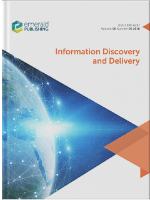
Information Discovery and Delivery
Illuminating Pathways in Computer Science and Information StudiesInformation Discovery and Delivery is a leading academic journal published by EMERALD GROUP PUBLISHING LTD, concentrating on the dynamic intersections of Computer Science and Library and Information Sciences. With an ISSN of 2398-6247, this esteemed journal has established its reputation by achieving a commendable Q2 ranking in both fields according to the latest quartiles, reflecting its commitment to advancing knowledge and practice in information discovery processes. With its Scopus ranking placing it in the 83rd percentile for Library and Information Sciences, and the 74th percentile for General Computer Science, the journal is recognized as an influential platform for researchers, professionals, and students alike. Its diverse and scholarly articles, spanning from its inception in 2017 through 2024, aim to explore innovative methodologies, technologies, and best practices that enhance information access and delivery systems. Although the journal is not Open Access, it remains an essential resource for those looking to delve into the latest findings and discussions shaping the landscape of information sciences. Join a community of thought leaders as we navigate the future of information discovery.
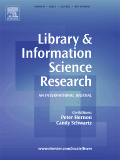
LIBRARY & INFORMATION SCIENCE RESEARCH
Innovating insights for a digital age.LIBRARY & INFORMATION SCIENCE RESEARCH is a premier academic journal dedicated to advancing the field of library and information sciences. Published by Elsevier Science Inc, this journal has established its reputation for rigorous research and impactful scholarship since its inception in 1987. With an impressive Q1 ranking in Library and Information Sciences and a Q2 ranking in Information Systems for 2023, it reflects the growing importance of library sciences in an increasingly digital world. The journal serves as an essential platform for researchers, professionals, and students, offering insightful articles that address emerging trends and challenges in the realm of information dissemination and management. Although not an open-access journal, its contributions are widely recognized, as evidenced by its strong Scopus rankings, with a position of #53 out of 280 in Library and Information Sciences. If you are looking to deepen your understanding of the dynamic interplay between libraries, technology, and information systems, LIBRARY & INFORMATION SCIENCE RESEARCH is an indispensable resource in your academic journey.

Bibliotecas-Anales de Investigacion
Empowering Voices in Library ResearchBibliotecas-Anales de Investigacion is a prominent scholarly journal dedicated to the field of Library and Information Sciences, published by BIBLIOTECA NACL CUBA JOSE MARTI, with its esteemed presence based in Havana, Cuba. This journal (ISSN: 0006-176X, E-ISSN: 1683-8947) plays a crucial role in disseminating research and insights relevant to the evolving landscape of library operations, information management, and user services. Acknowledged for its rigorous peer-review process, it is indexed in Scopus, currently classified in the 2023 Q4 quartile, ranking 199 out of 280 in its category, marking a significant contribution to the academic community despite its modest percentile of 29th. The journal welcomes original research articles, case studies, and reviews that explore contemporary issues and developments in library science, creating an inclusive platform for both seasoned scholars and emerging voices. Interested readers can anticipate a robust exploration of topics from information retrieval to digital libraries, aligning with the journal's objective to enhance knowledge and practice within the library and information sector. As the journal converges its themes from 2019 to 2024, it remains a vital resource for researchers, professionals, and students aiming to stay informed on the latest trends and innovations in the field.
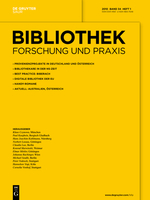
Bibliothek Forschung und Praxis
Shaping the Future of Library PracticesBibliothek Forschung und Praxis is a distinguished journal in the field of library and information science, published by WALTER DE GRUYTER GMBH. With its ISSN 0341-4183 and E-ISSN 1865-7648, this journal provides a vital platform for researchers, professionals, and students to explore the latest developments, innovative practices, and theoretical advancements in library research. Situated in the academic hub of Berlin, Germany, the journal encourages submissions that address a wide array of topics pertinent to libraries, archives, and information services, aiming to foster dialogue and collaboration within the global academic community. Although it currently does not offer Open Access options, the journal ensures rigorous peer-review processes uphold the integrity and scholarly quality of published works. With a commitment to enhancing the field of library science, Bibliothek Forschung und Praxis plays a crucial role in shaping best practices and promoting deeper understanding among scholars and practitioners alike.
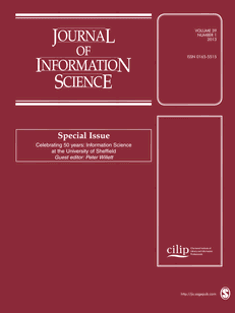
JOURNAL OF INFORMATION SCIENCE
Exploring the frontiers of information management and systems.JOURNAL OF INFORMATION SCIENCE (ISSN: 0165-5515; E-ISSN: 1741-6485), published by SAGE PUBLICATIONS LTD, stands as a leading academic journal in the realms of Information Systems and Library and Information Sciences. Established in 1979 and continuing through 2024, this journal has become a cornerstone for researchers, professionals, and students seeking to enhance their understanding of the rapidly evolving landscape of information management. With a commendable Q1 ranking in Library and Information Sciences and a Q2 ranking in Information Systems as of 2023, it demonstrates significant influence, evidenced by its 89th percentile ranking in Scopus for Social Sciences. Although it currently does not offer open access, the journal is committed to delivering high-quality, peer-reviewed research that addresses both theoretical and practical challenges in the field. Researchers and practitioners alike will find invaluable insights that bolster their work and contribute to the broader academic dialogue surrounding information science.
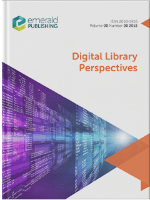
Digital Library Perspectives
Connecting Scholars with Cutting-edge ResearchDigital Library Perspectives, published by Emerald Group Publishing Ltd, is a pivotal journal in the dynamic fields of Education, Information Systems, and Library and Information Sciences. With an impressive Scopus ranking that places it in the Q1 category for Library and Information Sciences and Q2 for both Education and Information Systems, this journal has established itself as a significant resource for scholars and practitioners alike. The journal's ISSN is 2059-5816 and its E-ISSN is 2054-1694, facilitating broad accessibility to cutting-edge research and innovative practices within digital library environments. Published since 2016, it continues to offer a platform for the exploration of emerging trends, challenges, and technologies affecting digital libraries and information services. Researchers, professionals, and students will find that the journal not only highlights critical advancements but also fosters discussions around best practices and future directions in the industry. While it operates under a subscription model, it remains a crucial contributor to the scholarly dialogue in this essential sector.
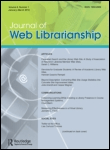
Journal of Web Librarianship
Inspiring New Paradigms in Library and Information SciencesWelcome to the Journal of Web Librarianship, an esteemed publication dedicated to the evolving landscape of library science and information technology. Published by Routledge Journals, Taylor & Francis Ltd, this journal serves as a vital platform for researchers and professionals to share innovative practices, methodologies, and research findings in the fields of Library and Information Sciences and Computer Science Applications. With an impressive impact factor reflected in its 2023 rankings—Q1 in Library and Information Sciences and Q2 in Computer Science Applications—the journal is well-positioned to influence the discourse and development within these disciplines. Since its inception in 2007, the Journal of Web Librarianship has continually contributed to the academic dialogue, ensuring a comprehensive understanding of the critical role that web technologies play in library services. Though it is not an open-access journal, it remains an invaluable resource for those dedicated to advancing the practice and theory of web librarianship. Join us in exploring the intersections of information and technology as we work towards a more informed society.

DESIDOC Journal of Library & Information Technology
Exploring the Intersection of Technology and Library SciencesDESIDOC Journal of Library & Information Technology, published by the Defence Scientific Information Documentation Centre, is a pivotal scholarly platform in the realm of Library and Information Sciences. The journal, indexed with ISSN 0974-0643 and E-ISSN 0976-4658, has established its reputation with a commendable Q3 category ranking in the latest Scopus quartiles and a notable rank of 113 out of 280 in its field, placing it in the 59th percentile. Engaging a global audience, it disseminates high-quality research insights aimed at advancing the practices and technologies within library and information management. Operating within a converged timeframe from 2012 to 2024, the journal is committed to fostering robust discussions surrounding contemporary issues in the field, making it an invaluable resource for researchers, professionals, and students alike. While currently not offering open access, its content is accessible through institutional subscriptions, reinforcing its significance in the academic community of India and beyond.

South African Journal of Libraries and Information Science
Empowering information professionals through open dialogue.South African Journal of Libraries and Information Science, published by FORUM PRESS, is a premier open-access journal dedicated to advancing knowledge and research in the realms of library science and information management. Since its inception, this journal has been pivotal in promoting scholarly discourse amongst librarians, information professionals, and researchers within South Africa and beyond. With its open-access model implemented in 2011, it provides an invaluable platform for the dissemination of research findings, encouraging accessibility and collaboration within the field. The journal features a diverse range of articles that explore contemporary issues, innovations, and best practices in libraries and information science, making it essential reading for those seeking to stay at the forefront of this dynamic discipline. By fostering open dialogue and knowledge sharing, the South African Journal of Libraries and Information Science plays a critical role in shaping the future of library and information science education and practice.